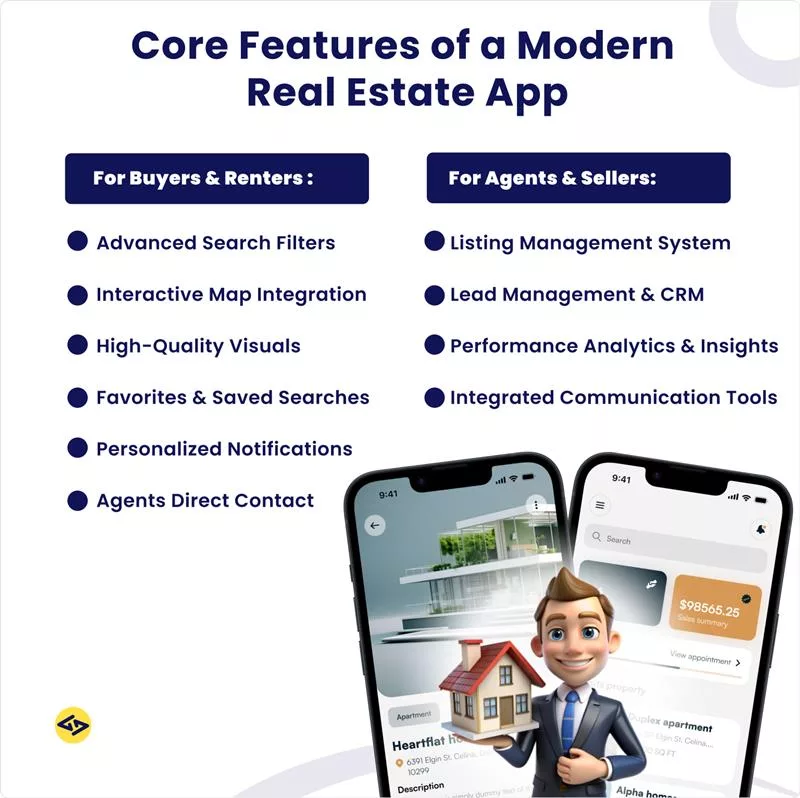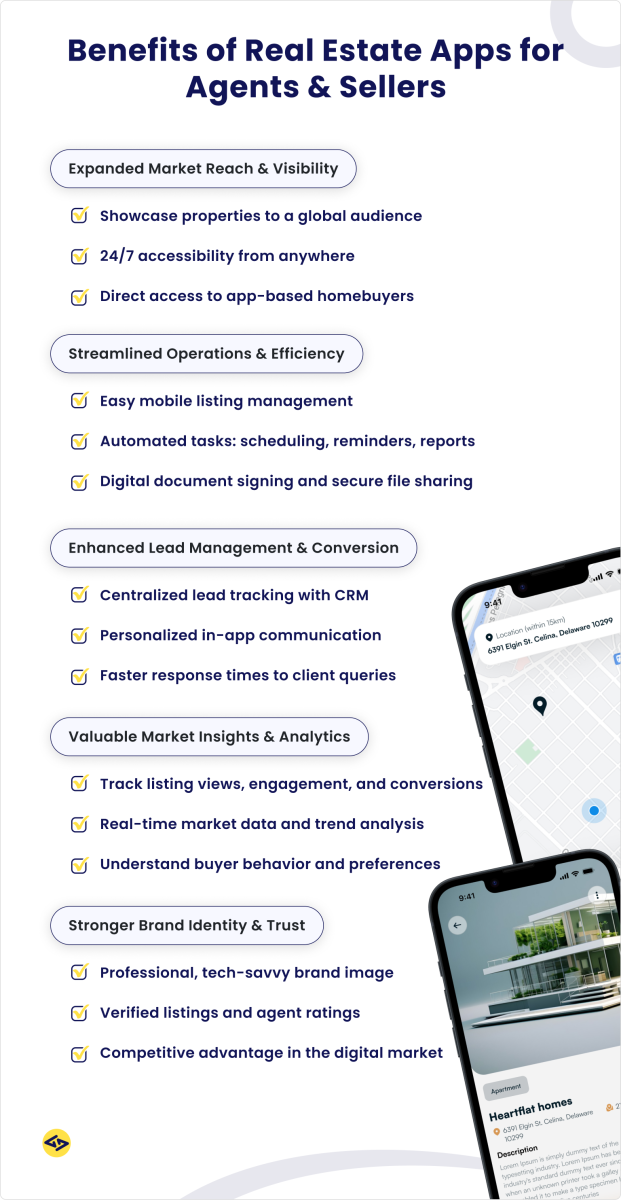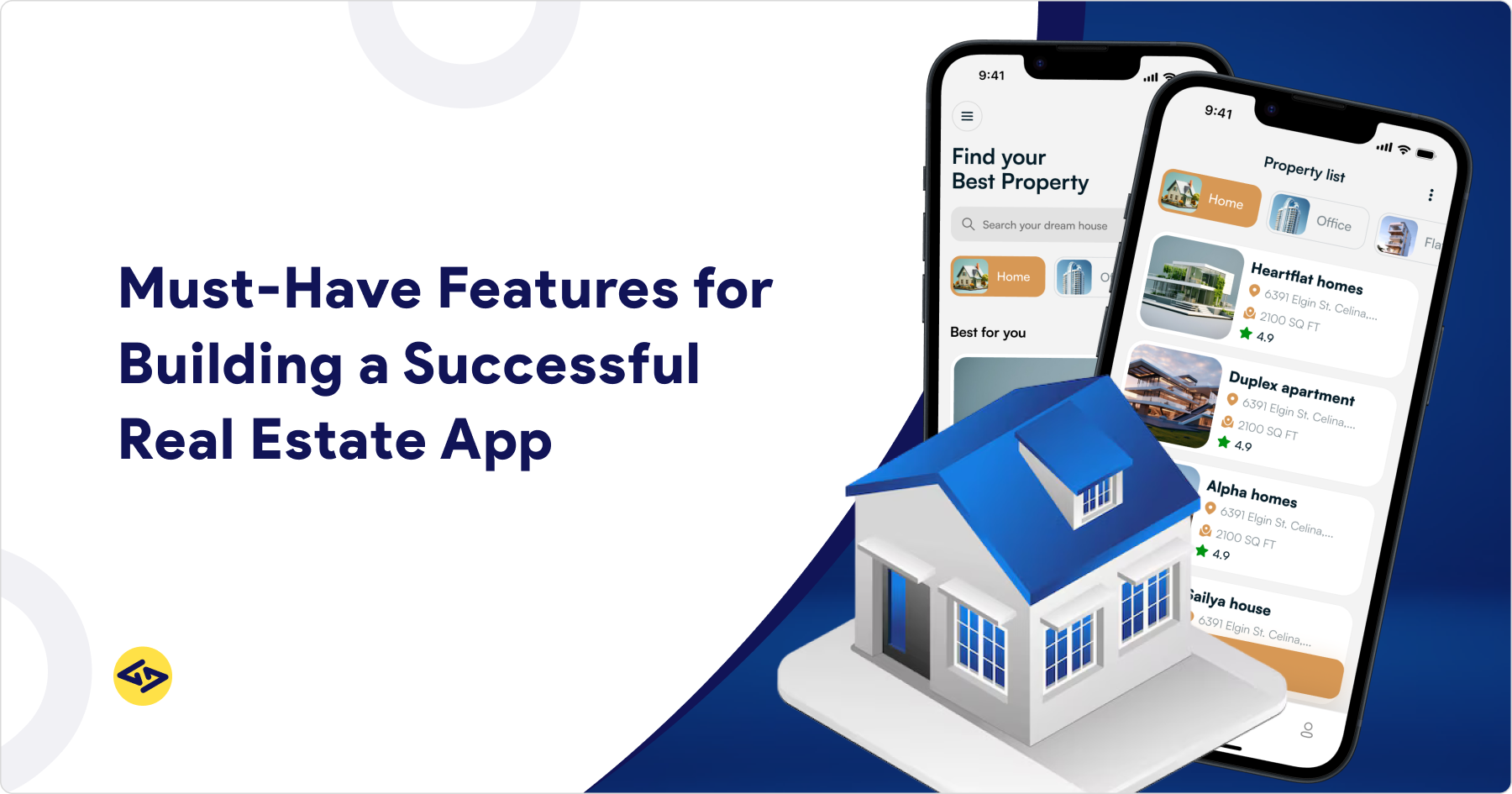No more endless listings in the newspaper and open houses. With the current high-paced property market, the keys to your next home, investment, or successful sale are literally at your fingertips. This revolutionary change, with the help of innovative solutions in real estate app development (which involves creating mobile applications that allow users to buy, sell, or rent properties), has changed the face of convenience and accessibility that comes with property transactions. In fact, the statistics speak volumes. Recent figures published by the National Association of Realtors (NAR) verify the astonishing fact that an incredible 67% of homebuyers used a mobile application or a mobile-based website to search and find their new home (Source: NAR 2023 Profile of Home Buyers and Sellers). This highlights how influential these digital platforms are today.
But why are these applications essential? This blog post will break down the essential functions that real estate applications should have. It will discuss critical features of the real estate listing app aimed at sellers and comprehensive property search app features to target buyers. We shall shed some light on the clear advantages of real estate mobile apps, exploring the key features of an easy real estate app interface and powerful real estate app functionalities. Our blog will also provide exclusive information on the innovative trends transforming property technology in the future.
What Are the Core Features of a Modern Real Estate App?
A modern real estate software should effectively cater to the interests of both a property seeker and industry professionals to be truly effective. These are the must-have features for a real estate app that constitute the core of an effective platform:

Essential App Features for Buyers and Renters:
1) Advanced Search Filters:
This essential property search app feature allows users to pinpoint listings precisely. Users can use advanced filters by location (city, neighborhood, specific radius), property type (house, apartment, condo), price, number of bedrooms and bathrooms, preferred amenities (e.g., gym, parking, pet-friendly and others. This finer level of search filters will result in a great real estate app UX and highly relevant search results.
2) Advanced Search Filters:
This essential property search app feature allows users to pinpoint listings accurately. Users can use advanced filters by location (city, neighborhood, specific radius), property type (house, apartment, condo), price, number of bedrooms and bathrooms, preferred amenities (e.g., gym, parking, pet-friendly, etc.). This finer level of search filters will result in a great real estate app UX (UX stands for User Experience, referring to how easy and pleasant the app is to use.) and highly relevant search results.
3) Interactive Map Integration:
A geographic display of properties in an easy-to-use map allows visual browse exploration. Users are able to see listings on a map, find properties within a certain radius of an interest (school, workplace), discover neighborhood boundaries, and custom search areas can even be drawn. This gives a clearer picture of property location and access, making the app more useful when it comes to the overall real estate app functionality.
4) High-Quality Visuals (Images, Videos, Virtual Tours):
This gives a more in-depth viewing experience by making properties come alive through the digital world. Clear photographs, spacious floor plans, informative video tours, as well as, in particular, 360-degree virtual tours would give potential buyers/renters an accurate visual representation of the layout and condition of the property without even having to visit it. This saves a lot of time and effort as it enables pre-screening (meaning users can evaluate properties remotely before deciding to visit).
5) Favorites & Saved Searches:
It allows users to bookmark properties of interest so that the favorite properties can be accessed later with a few clicks, forming a shortlist of possible homes. They can save their unique search criteria (e.g.: 3-bed apartment, $500k-600k, with balcony) and call it up at their convenience; they receive a far better UX of the real estate app as they no longer need to retype filters every time.
6) Personalized Notifications:
Whenever a user has saved searches or property favorites in the app, a notification is triggered automatically. This can be in the form of timely notifications of new listings that meet their specific criteria, drops in price of properties they have on watch, status updates (e.g. under offer), or other significant market changes, to keep them in the know on anything relevant, so that nothing passes them by. This feature highlights strong real estate app functionality.
7) Agents Direct Contact:
This functionality enables easy interaction between interested parties and real estate agents. It usually also offers choices of messaging within the app, direct calling, or filling out quick query forms on a listing page. This will facilitate rapid responses, asking questions, and scheduling of viewings.
Key Features for Agents and Sellers
1) Listing Management System:
This is a crucial real estate listing app feature for agents. It provides powerful tools to easily upload, edit, publish, and manage property listings with detailed descriptions, high-resolution media, and real-time status updates. It ensures accuracy and efficiency in showcasing properties.
2) Lead Management & CRM (Customer Relationship Management):
Comprehensive features to track inquiries, manage client interactions, categorize leads (e.g., hot, warm, cold), and schedule follow-ups. This centralizes client data and streamlines the sales pipeline, showcasing effective real estate app functionality for professionals. (CRM helps businesses manage and analyze customer interactions and data throughout the customer lifecycle.)
3) Performance Analytics & Insights:
Provides agents with valuable data on their listing views, lead engagement rates, conversion metrics, and overall market trends. This analytical capability empowers agents to optimize their strategies, understand what resonates with potential buyers, and refine their marketing efforts.
4) Integrated Communication Tools:
Strong in-app messaging platforms, scheduling tools, and notification management features simplify interactions with clients and other agents. This ensures all communication is organized and easily accessible within the app, improving responsiveness and client satisfaction.
What Benefits Do Real Estate Apps Offer for Agents and Sellers?
The adoption of real estate apps brings significant advantages, greatly affecting the efficiency and experience for all participants in the property market. Here are the key real estate mobile app benefits.

Expanded Market Reach and Visibility:
Wider Audience:
Apps enable agents and sellers to showcase properties to a massive, global audience that is actively searching for real estate. Unlike traditional methods, apps are accessible 24/7 from anywhere, dramatically increasing a listing’s exposure.
Direct Access to Buyers:
Many homebuyers prefer to search on apps, making it crucial for sellers and agents to have their properties listed where buyers are looking. This direct channel removes barriers and broadens the pool of potential buyers.
Streamlined Operations and Increased Efficiency:
Effortless Listing Management:
Agents can easily upload, edit, and publish property details, high-quality photos, videos, and virtual tours directly from their mobile devices. This significantly reduces the time and effort traditionally spent on listing properties.
Automated Tasks:
Apps can automate routine administrative tasks like scheduling appointments, sending reminders, generating reports, and managing paperwork. This frees up agents’ time to focus on high-value activities like client interactions and negotiations.
Digital Document Management:
Features for digital document signing and secure sharing simplify the closing process, reducing reliance on physical paperwork and speeding up transactions.
Enhanced Lead Management and Conversion:
Centralized Lead Information:
Integrated CRM functionalities allow agents to track inquiries, manage client interactions, categorize leads, and schedule follow-ups efficiently. All client data is centralized, making it easier to nurture leads effectively.
Targeted Communication:
Apps facilitate personalized communication through in-app messaging, push notifications, and email integration. Agents can send timely updates on new listings, price changes, or relevant market information directly to interested clients.
Improved Responsiveness:
Direct communication channels in the app enable quicker responses to client queries, enhancing customer satisfaction and increasing the likelihood of converting leads into sales.
Valuable Market Insights and Analytics:
Performance Tracking:
Apps provide agents and sellers with data on listing views, lead engagement, popular features, and conversion rates. This allows them to understand what’s working and optimize their marketing strategies.
Market Trend Analysis:
Access to real-time market data, historical property prices, and neighborhood trends helps agents provide data-driven advice to clients, position properties competitively, and identify emerging opportunities.
Audience Understanding:
By analyzing user behavior within the app, agents can gain insights into buyer preferences, popular search criteria, and demographic information, enabling more targeted marketing efforts.
Stronger Brand Identity and Trust:
Professional Image:
A well-designed and feature-rich app enhances an agent’s or agency’s professional image, showcasing their commitment to modern technology and client service.
Increased Credibility:
Features like verified listings, agent ratings, and transparent historical data build trust with potential clients, helping agents establish a strong reputation in the market.
Competitive Edge:
In a crowded market, having a dedicated real estate app with strong functionalities provides a significant competitive advantage, attracting more clients and listings.
Unique Insights & Future Trends in Real Estate Apps
The journey through the history of real estate apps goes far beyond the basic features to the benefits offered that shape the best real estate apps and, in turn, define the future of the industry. For successful real estate app design and functioning, these insights are the basis:
Building Trust and Transparency:
Future-forward apps prioritize trust, which involves incorporating strong verification processes into the real estate listing app features to validate the existence of properties and negate fraud. Agent ratings and reviews provide the way to hold agents responsible and inform professional choices for users based on transparent feedback. Providing unrestricted access to all historical sales data, including past sale prices and trends in the area, enables the user with third-party-unbiased information to lead to greater confidence.
Integrating Emerging Technologies for Immersive Experiences:
The future of real estate app development is closely linked with cutting-edge tech. Augmented Reality (AR) and Virtual Reality (VR) are being used for truly immersive virtual tours, allowing potential buyers to virtually walk through properties, visualize furniture placement in empty rooms, or explore neighborhood amenities from afar. For example, some apps allow users to place virtual furniture in an empty room using AR. Artificial Intelligence (AI) is applied for predictive market analysis (forecasting price movements), highly personalized property recommendations based on user behavior, and automated customer support through intelligent chatbots, enhancing property search app features. An example would be an AI that recommends properties based on a user’s past searches and saved favorites.
Facilitating Seamless Communication & Interaction:
Moving beyond basic contact forms, the emphasis is on creating strong in-app messaging platforms, integrated video call functionalities, and advanced scheduling features. This aims to build a collaborative digital space that makes communication easy and smooth among buyers, sellers, agents, and even third-party service providers (e.g., mortgage brokers, inspectors) involved in a transaction, improving the overall real estate app UX.
Conclusion: Real Estate Apps: Your Journey, Made Easy
Real estate apps have made a big difference in how people buy and sell properties. The whole process is now much easier and more convenient for everyone. Buyers can quickly search for homes, compare options, and access all the necessary information in one place. Sellers can reach a wider audience and manage their listings more effectively. Agents also receive useful tools to stay organized and communicate more effectively with clients. As technology continues to improve, these apps will play an even larger role in the property market. They are making the journey smoother and more enjoyable for years to come. Contact iCoderz to learn more about how iCoderz can help you! We’d love to hear your thoughts!
Ready to build your real estate app?
Let’s turn your idea into a powerful digital platform!




